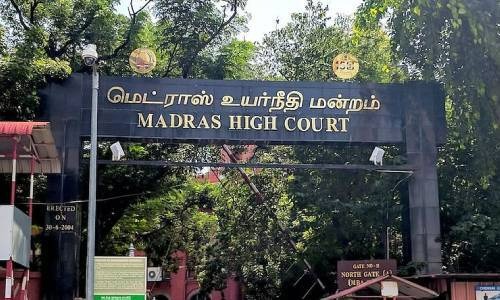
Case Title: Arul Daniel and others v. Suganya
The subject of whether the provisions of Section 482 CrPC and/or Article 227 of the Constitution apply to invalidate an application under Section 12 of the Domestic Violence Act was recently referred to a bigger bench by a single judge of the Madras High Court.
Several petitions were being considered by Justice N Sathish Kumar to use the clause in Section 482 CrPC to invalidate an application submitted under Section 12 of the DV Act.
Justice Sathish Kumar noted that a Section 482 CrPC petition is maintainable in Domestic Violence Act proceedings, which was also noted in the recent division bench ruling that determined that the Domestic Violence Act's legal processes are civil. This remark, according to the sole judge, was at odds with Supreme Court rulings. To establish a bench with the necessary strength to consider the following concerns with authority, he instructed the registrar to bring the following matters to the Chief Justice:
1. Can an action under Section 12 of the D.V. Act be contested under Section 482 of the Criminal Procedure Code or Article 227 of the Constitution?
2. Is the aforementioned remedy accessible to a party who has been wronged before filing an appeal under Section 29 of the D.V. Act with the learned Magistrate and, if required, the Court of Sessions?
The sole judge noted that multiple petitions under Section 482 CrPC had been filed in response to the division bench's ruling, challenging the applications made under Section 12 of the Domestic Violence Act for different reliefs. When the cases were taken up, some of the attorneys present in court, including Senior Advocate Mr A. Ramesh, Mr M. Mohammed Riyaz, and Mr A. E. Ravichandran, drew attention to the fact that the division bench's decision included contradicting findings and cast doubt on the judgement itself. Although the Single Judge was unable to override the Division Bench's judgement, the court indicated that it might consider the maintainability of the case where the Division Bench's decision conflicted with the Supreme Court's ruling.
“Of course, a learned Single Judge cannot by-pass the judgment of the Hon'ble Division Bench, but at the same time, when the findings of the Hon'ble Division Bench appear to run counter to the decisions of the Hon'ble Supreme Court and the findings also run counter to its findings, this Court is of the view that this Court can still go into the maintainability of the petition filed under Section 482 of Cr.P.C. challenging the application filed under Section 12 of the D.V.Act.”
The court said that the division bench had agreed with Justice Anand Venkatesh's views in P. Pathamnathan V. Monica to hold that Domestic Violence Act proceedings are civil. The division bench had noted that the DV Act's correct decision does not have criminal repercussions, hence it is not a criminal procedure. However, it went on to rule that a petition under Section 482 of the CrPC might be maintained in opposition to Chapter IV of the DV Act proceedings. The court further pointed out that Section 28(2) of the DV Act grants the Court authority to establish its process.
As a result, exercising authority under the CrPC is not required, and there are other exclusions listed in Section 28(2) of the DV Act that the Division Bench did not address.
The court further mentioned that an appeals procedure before a Court of Session is included in the Act itself. Thus, the question of whether a petition under Section 482 of CrPC is maintainable still exists when an efficient alternative remedy is already available via statutory appeal under Section 29 for the procedure performed under Chapter IV of the DV Act. The Supreme Court's unequivocal rulings that inherent powers under Section 482 CrPC may only be used in cases when no other options are available were noted by the court. The court noted as follows:
“Therefore, permitting a petition under Section 482 of Cr.P.C. to challenge the proceedings under Section 12 of the D.V.Act without exhausting the remedies available under the Statute before the learned Magistrate and the Court of Sessions, there would be parallel remedies; one before the learned Magistrate and other before the Sessions Court or the High Court, which is clearly against the settled principles of law and it would only lead to flooding of petitions under Section 482 of Cr.P.C.”
The court also disagreed with the division bench's assertion that every judge, regardless of the portfolio, has the right to exercise inherent jurisdiction under Articles 226 and 227 of the Constitution since it conflicts with the Supreme Court's rulings. The solitary judge decided it was appropriate to submit the case to a bigger bench for an official ruling in light of these divergent opinions.

